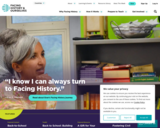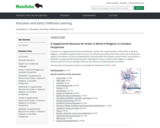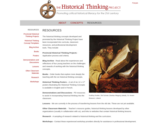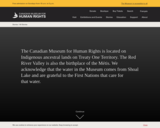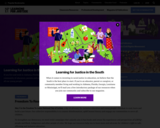
Sign up for a 45 minute virtual field trip, and follow it up with a classroom unit about human rights and being an upstander. The classroom unit includes an inquiry project.
Virtual Field Trip:
Students will learn how to be human rights upstanders by discovering the stories of people who used their personal strengths to take a stand to protect their rights and the rights of others, creating change.
Students will:
1. Learn to identify traits all upstanders possess and understand that each of us also possess these traits in our own unique way.
2. Experience exhibits and the inspiring Museum architecture as if they were at the Museum in person.
Interact with a Museum guide and ask questions to better understand how they can take action for positive change.
3. Engage in discussion, critical thinking and reflection on their role in the protection of their own rights and the rights of others.
Classroom Unit:
The Be an Upstander resource is a project-based learning unit designed to complement the “Be an
Upstander” school program. This resource targets students in middle years and encourages inquiry and
action on human rights issues. Students will examine the traits of human rights upstanders and follow
their example. By the end of the project, students will have had the opportunity to explore an issue they
are personally passionate about, share their knowledge and lead others toward action.
The Be an Upstander website is a digital student experience designed to support student learning as part
of a larger human rights themed, project-based learning unit. Students developing upstander projects
will engage in personal inquiry and action on human rights issues that matter to them. Students will learn
about the traits of human rights upstanders, be introduced to the Universal Declaration of Human Rights
and examine their personal strengths. Following the example of the upstanders they learn about,
students will be challenged to take tangible steps to becoming human rights upstanders themselves.
If you need this resource in a different format for accessibility purposes, please contact
info@humanrights.ca.
Be an Upstander website: https://humanrights.ca/upstander/#/
Complementary teacher's guide https://humanrights.ca/upstander/#/teacher-guide
- Subject:
- 21st Century Competencies
- Education
- Elementary Education
- Emotional Wellness
- English Language Arts
- Social Studies
- Spiritual Wellness
- Wellness
- Material Type:
- Activity/Lab
- GAP 5
- GAP 6
- Unit of Study
- Author:
- Canadian Museum for Human Rights
- Date Added:
- 05/02/2023



